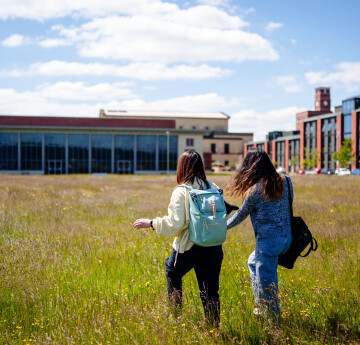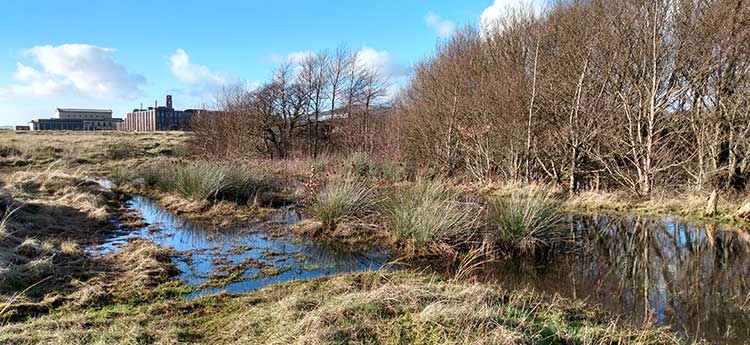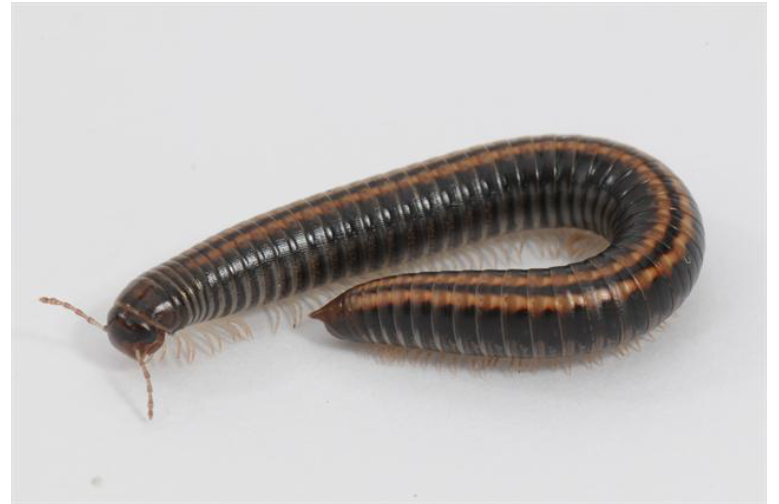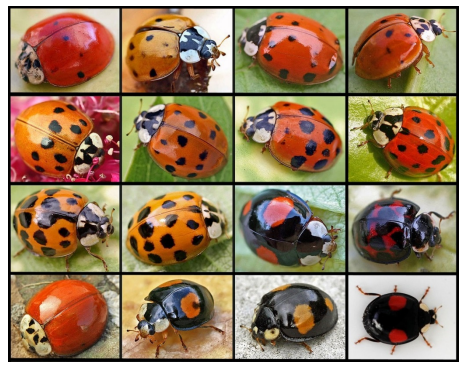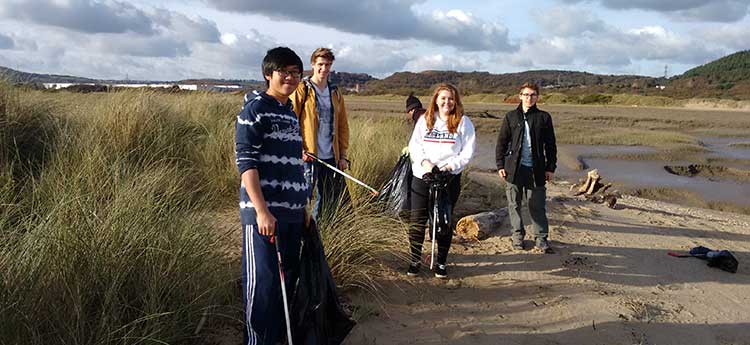Gulls have always been a regular sight in coastal areas such as Swansea and as humans encroach onto their natural habitat, they are finding inventive places to nest and raise their chicks. Buildings make ideal replacements for nesting cliffs and thanks to our wastefulness, cities provide rich pickings for these adaptable animals.
We have three species nesting on the roofs of Singleton Campus; herring gulls, lesser black backed and great black backed. At first sight they look very similar, can you spot the difference?

All pictures © Andreas Trepte http://www.photo-natur.net/
Gulls are long lived (around 30 years), monogamous and generally pair for life, with divorce rare. They re-establish bonds in early spring, repairing or rebuilding nests in April and laying eggs in early May. Urban birds make nests that they will use year after year with fledging taking place in July/August. In the UK gulls are protected by the Wildlife and Countryside Act (1981). Anyone killing, injuring or taking a bird, damaging or destroying its nest or taking or destroying its eggs without a licence from NRW is guilty of an offence and risks prison and a hefty fine.
THE NESTING SEASON – WHAT TO EXPECT:
The gull-nesting season can be divided into five overlapping periods as follows.
1. Nest Building and Laying of Eggs (April-May)
Gull nests are not elaborate structures, just a loose pile of twigs, pebbles and moss, with two or three eggs laid in early May. Nests are sometimes destroyed by windy weather. If you happen to see a damaged nest don’t worry, it is likely that the gulls will try again.
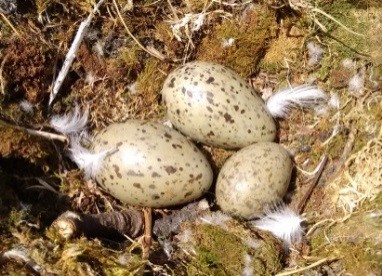
2. Baby Gulls And Fluffy Chicks (May-June)
Very small chicks (up to 3 days old) need the warmth of their parents at night and will need access to the nest as they are still very vulnerable at this stage. Chicks older than 3 days do not need to go back to their nest. Once they are more than a few days old they become quite active, exploring the roofs and some may fall to the ground. They are remarkably resilient (they evolved nesting on sea cliffs) and can survive a surprisingly long fall unharmed. Gull parents are very attentive and protective and will do all that they can to keep their young fed, watered and safe, even on the ground (see below).
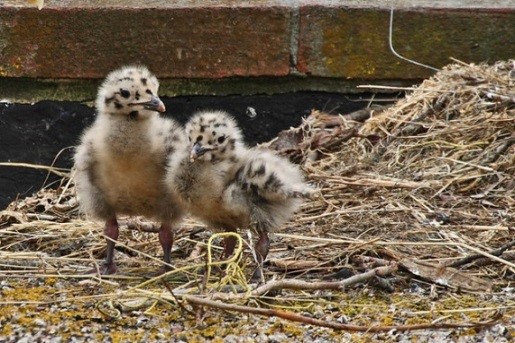
3. Nestlings (Partially Feathered) (June-July)
As feathers start to appear gull chicks become more adventurous and may attempt to fly. This inevitably leads to some chicks ending up on the ground. Please don’t try to rescue or feed the chick, they are best left, unless injured or in a dangerous location like a busy road (in which case you may move them to a safer location nearby). The parents will continue to protect and feed their offspring and may attack you in an attempt to defend their young.
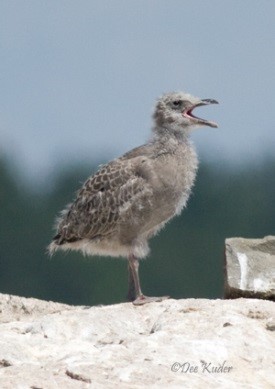
4. Fledging (Fully Feathered and Developed) (July-Aug)
Fledglings can be identified as those whose wing tips overlap the base of the tail. As with all fledgling birds they are often unsuccessful when they take their first flight and may land on the ground. Fledglings should be left alone even if on the ground, unless injured or in a dangerous location like a busy road (in which case you may move them to a safer location nearby). Parents generally continue to feed their fledged chicks for a few weeks but will often withhold food in an attempt to encourage their young to fly up to them, this is normal the young birds will be very vocal in their begging.
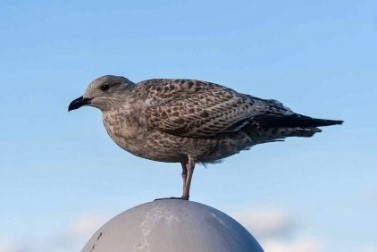
5. Gull Flying Accidents (Aug-Sept)
The final stage is when the young birds are flying and getting used to their wings. This can result in a variety of incidents such as window strikes or getting caught in roof netting and as a consequence can be found with a whole variety of injuries.
WHEN TO GET INVOLVED:
1. Abandoned Chicks
Gulls are very protective parents and will usually continue to feed and guard their young even if they fall from the nest. If you are concerned that a chick has been abandoned, offer a bowl of water (especially in hot weather and watch from a distance. If you see it defecate it is a good sign that it is still being fed. Only if you are sure after 24 hours that it has been abandoned should you consider intervening. They will need specialist care that avoids habituating them to people and the Gower Bird Hospital (01792 371630) is equipped to deal with them. It is likely that they will request you to take them in yourself as the Gower Bird Hospital has very limited resources to provide collections.
2. Injured or at Risk Birds on the Ground
Gull chicks fall from buildings either to lower roofs or the ground every year. Most of these will survive uninjured and continue to be protected and fed by their parents. It is common for young gulls to be calling to their parents; whining and whimpering. This is normal and not a sign of distress. All young gulls do this - it is nothing to worry about. As a general rule most wildlife avoids making noise when injured to avoid attracting predators. Offer a bowl of water but please don’t try to rescue or feed the chick, they are best left unless injured or in a dangerous location like a road (in which case you may move them to a safer location nearby). If you approach a chick it is likely that this will trigger a defensive response from the parents. Warning calls may be followed by them “dive-bombing” you. An umbrella provides good protection from defensive parents! But, please only do this if you believe it to be necessary and it is safe for you to do so. Please do not ever put yourself in danger. It is generally not a good idea to try to return a chick back to the nest. As well as the likelihood of it falling again, it may result in it being attacked by other gulls if placed too close to the wrong nest. The University does not put chicks back on roofs and please don’t attempt to do so yourself. You may be concerned about the risk of young birds on the ground being taken by predators. Gull parents are quite capable of driving predators away but inevitably some young or injured birds will be caught. This might seem distressing but is entirely natural – the predators probably have young to feed too. Rescue centres will not normally take in fledglings just because there are predators around. Rescue centres and charities have to prioritise the injured chicks and birds and facilities do not exist to take in the thousands of fledglings found annually across the UK. If you consider the gull to be injured and in need of veterinary treatment please call your local vet, the RSPCA (0300 1234999) or the Gower Bird Hospital (01792 371630). You will probably be asked to take the bird in yourself.
3. Trapped Birds
Chicks and gulls can become trapped in confined spaces or in netting on campus. Netting is not standard practice and is only installed on buildings to prevent nesting where; there is plant on the roof that needs protecting, or to minimise disturbance where regular access to the roof is required. When netting is installed correctly it should not pose a threat to wildlife, but in rare instances birds can become trapped. Please report any trapped birds to the helpdesk https://quemis.swan.ac.uk/helpdesk/users/login.asp as quickly as possible and we will attend to these as soon as we can get a trained member of staff to the scene. Sustainability Team April 2019 (V1)
4. Feeding Chicks
Gulls do not feed their young as often as garden birds would feed theirs. A blue tit, for example, may feed as often as every 5 minutes or more. Gulls feed 3-6 times a day - mainly in the early morning, late afternoon and evening. Frequently people believe that chicks and youngsters are not being fed, as they have not seen the parents come down to a young bird all day. If the parents are on the roof above and a youngster is on a lower roof or the floor, they will normally be coming down to feed still. Gulls are excellent parents do not abandon their young very easily. If you see a chick defecate it is a good sign that it is still being fed. Hand feeding or putting food out for the chick may lead to the youngster being attacked by other adult gulls that want the food too and can result in a parent bird attacking you. It also risks habituating the bird to humans and associating them with food, leading to problems in later life – never feed gulls or their chicks.
5. Providing Water
In very hot or prolonged periods of sunshine or where you have concerns that a chick has been abandoned then providing fresh water to drink is the most useful thing that you are able to do. Place a bowl or saucer of water in a shady area nearby and top up with clean water daily. Further Information If you have any general queries relating to gulls (or other wildlife) on campus then please contact the Biodiversity Officer.

